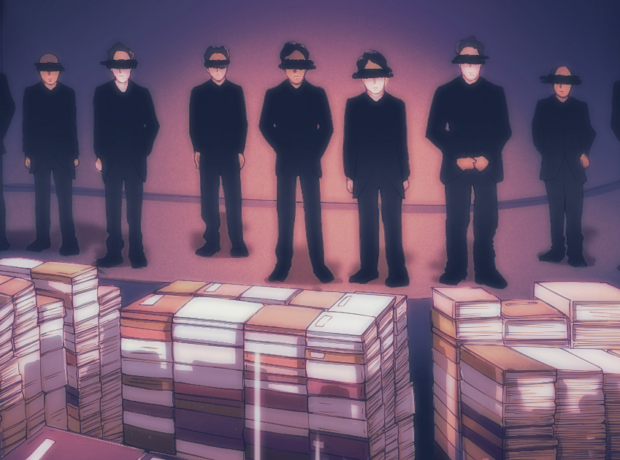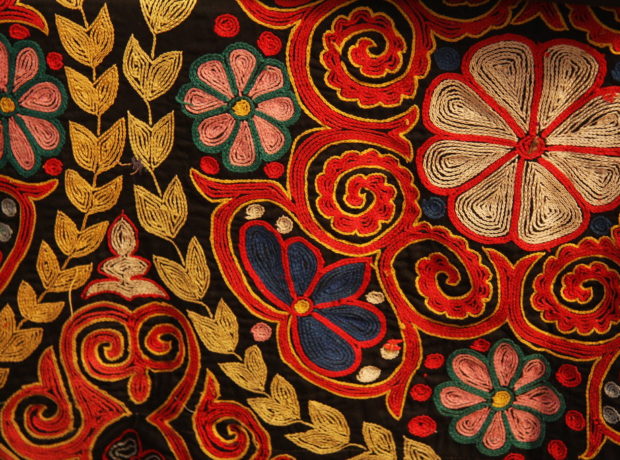Why do moral people make us uneasy? Is it inevitable that power leads to corruption? And why do the majority of Brits believe the Empire was a good thing? From a Pulitzer Prize winner to a book that gives the middle finger, we present Lacuna’s pick of six books to open your mind.
Galileo’s Middle Finger: Heretics, activists and one scholar’s search for justice (Alice Dreger, 2015)
Chooser – Lacuna editor James Harrison.
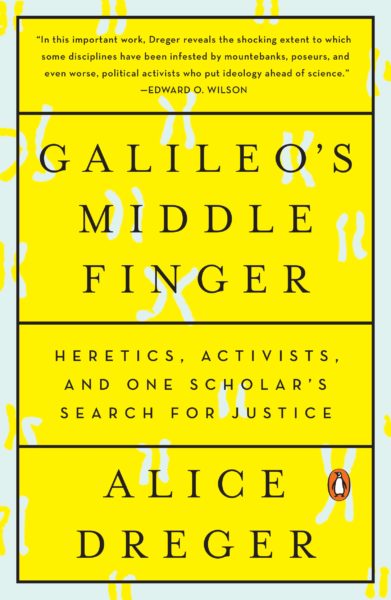 “Soon enough, I will get to the death threats, the sex charges, the alleged genocides, the epidemics, the alien abductees, the anti-lesbian drug, the unethical ethicists, the fight with Martina Navratilova and, of course, Galileo’s middle finger. But first I have to tell you a little bit about how I got into this mess.”
“Soon enough, I will get to the death threats, the sex charges, the alleged genocides, the epidemics, the alien abductees, the anti-lesbian drug, the unethical ethicists, the fight with Martina Navratilova and, of course, Galileo’s middle finger. But first I have to tell you a little bit about how I got into this mess.”
An explosive start to a book by an academic, and it is a riveting read. It’s about academics studying issues of sex and gender coming into conflict with identity politics activists.
Beneath this, it is an expose of the inadequacies of modern activism and academia; a provocative gesture (the middle finger) towards people who do not take seriously the pursuit of scientific knowledge; and a call to defend truth and justice.
Published in 2015, it’s particularly relevant in our current political dystopia.
Strangers Drowning: Voyages to the Brink of Moral Extremity (Larissa MacFarquhar, 2016)
Chooser – Lacuna intern Rose Mudie
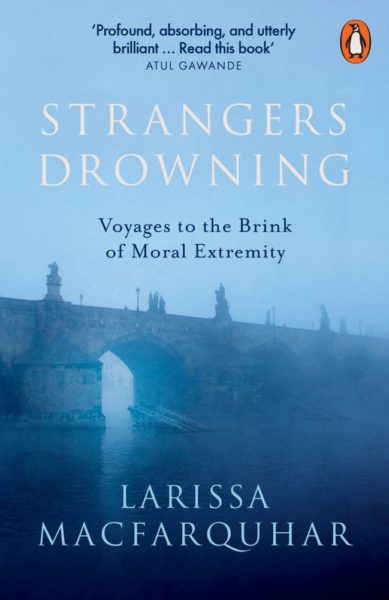 Told through the stories of people living lives of extreme ethical commitment, MacFarquhar explores the moral implications of caring for strangers even at the expense of friends, family or ourselves. From a couple who adopt more than 19 children to a family moving to India to set up a leprosy colony with no protection, moral capability and charity is questioned to its most extreme possibility. Looking at the stubborn integrity, compromise, recklessness and moral dilemmas of extreme do-gooders, the reader is challenged to question what we value most in our lives and why.
Told through the stories of people living lives of extreme ethical commitment, MacFarquhar explores the moral implications of caring for strangers even at the expense of friends, family or ourselves. From a couple who adopt more than 19 children to a family moving to India to set up a leprosy colony with no protection, moral capability and charity is questioned to its most extreme possibility. Looking at the stubborn integrity, compromise, recklessness and moral dilemmas of extreme do-gooders, the reader is challenged to question what we value most in our lives and why.
The Color Purple (Alice Walker, 1982)
Chooser – Lacuna intern Zahra Anwar
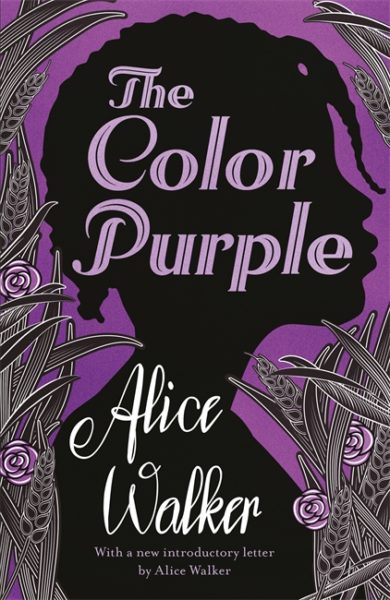 “Until you do right by me, everything you touch will crumble.
“Until you do right by me, everything you touch will crumble.
He laugh. Who you think you is? He say. You can’t curse nobody. Look at you. You black, you pore, you ugly, you a woman. Goddam, he say, you nothing at all.”
This Pulitzer Prize-winning book is written in letterform, with protagonist Celie narrating the brutality that she faces from men, the degradation imposed on her for being a black woman and her journey to independence. Setting her tale in rural Georgia in the 20th Century, Alice Walker tackles the dogma and centuries-old misconceptions of race, feminism and sexuality. Previously been based on submission, Celie’s world changes when she encounters two women who refuse to bow their heads. The novel then broadens to express the significance and indestructibility of strength and power within love.
Natives: Race and Class in the Ruins of Empire (Akala, 2o18)
Chooser – Lacuna poetry editor Jack McGowan
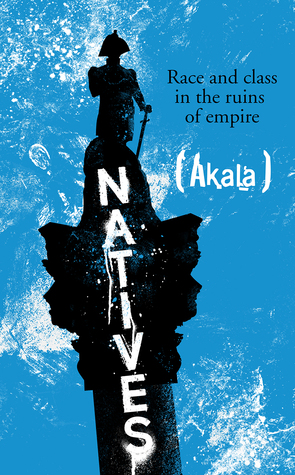 “I was not born with an opinion of the world but it clearly seemed that the world had an opinion of people like me.”
“I was not born with an opinion of the world but it clearly seemed that the world had an opinion of people like me.”
Akala begins Natives with a discussion of personal identity, and his analysis remains grounded by intimate and real lived-experience despite covering a blistering array of topics including education, policing, sports, and cultural representation through music and media. By invoking conversations that occur at the intersections of race and class, Akala appeals to our cultural and historical experiences in order to firmly debunk notions of race and class bigotry as the actions, behaviours, and predilections of individuals. Instead, we are treated to a prodigious and excoriating examination of the implicit systems of oppression that underpin race and class bias in contemporary society, with a generous helping of frank (and frankly eye-opening) observations.
(Akala selects his own Great Reads in his YouTube series. See below…)
The Adversary: A True Story of Monstrous Deception (Emmanuel Carrère, 2017)
Chooser – Lacuna editor-in-chief Andrew Williams
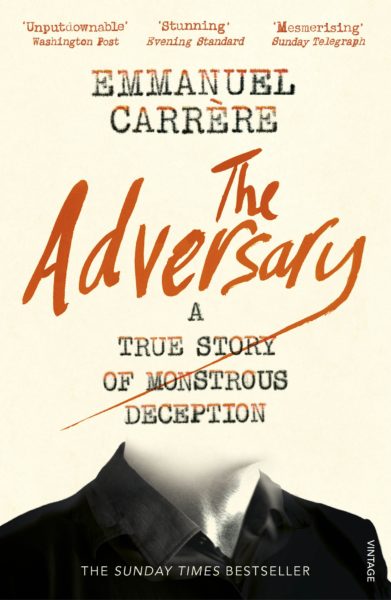 How do you write about the most terrible of human acts? Carrère questions his own moral position as he unpicks the story of Jean Claud Romand who, in 1993, killed his wife and two children for no apparent reason.
How do you write about the most terrible of human acts? Carrère questions his own moral position as he unpicks the story of Jean Claud Romand who, in 1993, killed his wife and two children for no apparent reason.
Carrère’s curiosity drives him to delve deeply into Romand’s life and brings him close to the killer in his attempt to understand how a seemingly normal man could commit such a crime.
As he uncovers a lifetime of spiralling deceit leading inexorably to senseless murder, he challenges his reason for writing about “evil” and, perhaps, our appetite for reading about it too.
Animal Farm (George Orwell, 1945)
Chooser – Lacuna editor Mary Griffin
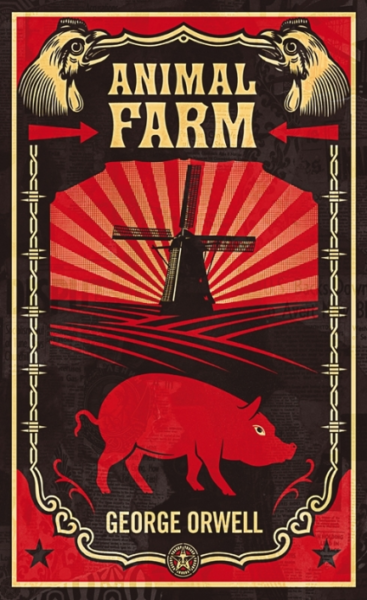 “All animals are equal, but some animals are more equal than others.”
“All animals are equal, but some animals are more equal than others.”
Orwell’s allegory describes social classes and revolutionary roles through a gang of farm animals revolting against their human masters. What starts out as a hopeful collective campaign for change is soon blighted by propaganda, threats and the silencing of dissenters, all fuelled by inescapable, poisonous greed.
In this timeless classic, Orwell conveys complex ideas using simple language, satire and subtlety.
If, during your school days, you begrudgingly skim-read this book under duress, go back and take another look. It’s short, it’s sharp and it’s driven by fast-paced action. And, more than 70 years after it was written, it may still entice you to draw parallels with some of today’s political personas.

